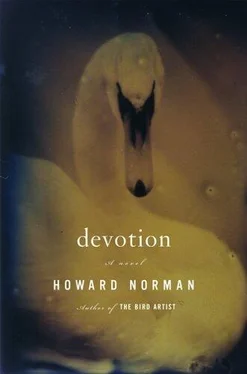MAGGIE HAD INSTALLED her father in the main house in late September 1985. He had slept through the entire flight from London to New York, slept the flight from New York to Halifax. Slept in the car to the estate. Since then, Maggie had made eighteen visits and telephoned at least once a day, even from Europe or the United States. David circled the date of each of her visits on a wall calendar in his kitchen. On all but a few of those, Maggie stayed the night in the upstairs bedroom of the main house.
Ground rules were set right away. William wrote them out:
Under no circumstances — none — does my daughter want to see you. If possible I’ll give you 24 hours advance warning of her visits. When Margaret is here, you need to be a ghost. You eat breakfast, lunch and supper at the Glooskap restaurant or the bakery or wherever. There’s an all-night diner in Truro. P.S.: To my mind you’re a goddamn fortunate man that Margaret’s allowing you to remain her husband, on paper. For norm at least.
The night of July 27, 1986, there was a cricket somewhere in David’s kitchen. He thought it might be behind the toaster, or in the toaster. Or possibly in the bread box. A small embroidered Home Sweet Home pillow at his lower back, he was on page 88 of The Crime of Sylvestre Bonnard. It was 3:15 A.M. David dozed off, head down on the table, but almost immediately was startled awake by a sound that was at once vaguely familiar and joltingly strange. The guesthouse and pond a hundred feet away were surrounded by woods. What David heard might have been a porcupine or bobcat; they sometimes produced such eerie calls. Possibly a screech owl. He took a flashlight from a drawer, stepped out to the porch. Wild white moonlight. He hardly needed the flashlight, but he aimed it at the pen, located halfway to the pond. The swans were huddled in three groups. He recalled that Maggie once showed him an entry in the diary of an eighteenth-century naturalist named Mark Catesby: I’m told by natives that swans mate for life. I have observed that swans have other behaviors as well. However, none of the Tecoskys’ swans were paired up. They’d arrived at the estate individually wounded.
David stepped barefoot off the porch; the cold grass felt oddly soothing. Crickets. Then David heard a rasping shriek, then an asthmatic reedy bray, and recognized the source. It was the clarinet Maggie had provided her father, on advice from Dr. Epson, to help strengthen his diaphragm, but which William also used, obnoxiously, as a kind of woodwind alarm system. David mentioned this to Naomi, who said, “Turn that clarinet into kindling. Why can’t he just ring you up?”
But David was obligated here. It could be a real crisis. He was the male nurse, after all. He was the caretaker of the estate, for now. He heard the swans’ wings fluttering, their jostling about the pen. William’s clarinet had this effect on them. On the porch of the main house, he took the key from under the dirt-filled, flowerless terracotta vase, but remembered that William locked the place only when he was away. He opened the door and called out, “William, it’s me, David!” Entering the guest room, David turned on the small table lamp near the door. He saw that the clarinet lay crosswise on the wheeled cart next to the bed. Vials of pills were lined up neatly on the cart, along with a pitcher of water and a glass. William sat upright against the headboard, watching the TV at the foot of the bed. He was dressed in long-sleeved gray pajamas.
“Looks like there’s no emergency,” David said.
William wrote something on a three-by-five card and handed it to David. David stepped back toward the lamp and read: I’ve been thinking. I appreciate your nursemaiding me these months. But it doesn’t change things. I have bad dreams about that taxi. When the right time comes, I’ll knock your lights out.
“Status quo,” David said. “Well, your attitude toward me hasn’t got worse. That’s something.”
William wrote another note. David read it: Why not watch this movie with me. It’s called Background to Danger. It started only ten minutes ago.
David turned off the light, sat in the wicker rocking chair next to the bed. He had not heard of Background to Danger. Right away he saw that Peter Lorre was in it. Lorre was standing in an alley (“That guy’s a weasel,” William muttered) and slipping his hand into his trenchcoat pocket. He was talking to a man standing close by, whose shadow against the wall did not intervene. Close by because otherwise the knife Lorre now revealed would be of little threat. Lorre’s mouth twitched a smile, then suddenly fell into a severe frown — no middle ground with this fellow. He spoke with his famous petulant, whining accent, something of a malignant Esperanto; after all, in his movies you never really knew which country Peter Lorre was from, a creepy soul without portfolio. His voice had a fingernails-on-blackboard effect. “A man betrays, he pays for it,” Lorre said. “But sometimes he gets assistance paying for it, you see. That’s why I’m here. To help you pay for it.” The knife flicked forward and back, and the shadow crumpled down the side of a brick building.
William had fallen asleep and was lightly snoring. David watched the movie until its closing credits and then turned off the television. He had enjoyed Background to Danger very much. Yet with the onset of a headache and newly jangled nerves — David suspected the cause may have been seeing Peter Lorre and recalling the surgeon’s analogy in the London hospital — he realized that in all likelihood it was to be a night of wretched insomnia. While his inclination was not to try figuring out all the whys and wherefores of his frequent sleepless nights, he long ago learned to recognize their advance notices. The subtle pressure behind the eyes, the prescient slight nausea, his plummeting spirits. With Maggie on their honeymoon, he’d had three sleepless nights at intervals; Maggie had slept soundly. He told her about the problem. On a walk along the cliffs near their hotel, she said, “You also talk in your sleep, darling.” When he asked what he’d said, Maggie was circumspect, mentioned just a few names. “It varies, but three or four nights, it’s as if you’re speaking with a Dr. Steenhagen. Does that name ring a bell?”
“Jesus, that’s my pediatrician. From Vancouver.”
“And what about — Dynaflow?”
David started to laugh with incredulousness. “That was my dad’s car. An American car, a Buick, Dynaflow transmission. I was always begging my mom to let me sleep in the Buick on summer nights.”
“Did she let you?”
“Once or twice.”
“Well, you must be dreaming of this Dr. Steenhagen and that car, David. That’s all I know.”
“Do I keep you awake?”
“I eavesdrop a few minutes, then nod right off. Maybe that’s selfish, huh? Should I wake you?”
“Why both not sleep?”
“They say if you talk talk talk a troubling thing out, you might make all sorts of connections. I suppose that’s Freud in a nutshell. But you know what I mean.”
David knew the connection between Dr. Steenhagen and the Buick. He regretted not informing Maggie about it then and there. (He thought: What kind of choice was that, either not sleep or talk in your sleep, on one’s honeymoon? Did Maggie now think she was in for a lifetime of this?) After his parents’ divorce, he started having what Dr. Steenhagen called “nervous stomach.” It kept him awake at night. His mother made an appointment. When asked what she thought might be the source of the problem, she said, “Well, I think one culprit’s David’s cursive example.”
Students worked on their “cursive example” every Thursday morning. Blue, wide-lined notebooks were handed front to back down the aisles of standard Canadian school desks, pencils were distributed, and then David’s fifth-form teacher, Mrs. Dhomhnaill, would say, “Here is today’s paragraph. It’s from The Pickwick Papers by Charles Dickens,” or some other famous book. She’d read the paragraph with glacial deliberation, allowing the students to take dictation, the entire class transformed into stenographers. “You have two minutes by the clock to hand in your examples.”
Читать дальше












